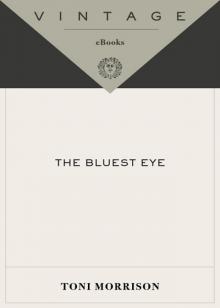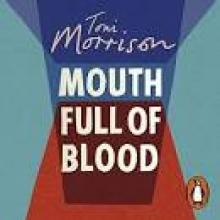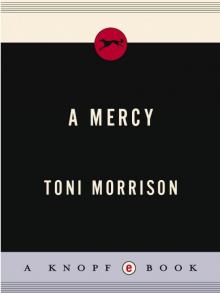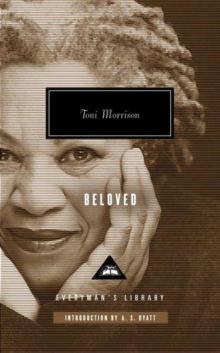Home Read online
THIS IS A BORZOI BOOK
PUBLISHED BY ALFRED A. KNOPF
AND ALFRED A. KNOPF CANADA
Copyright © 2012 by Toni Morrison
All rights reserved. Published in the United States by Alfred A. Knopf, a division of Random House, Inc., New York, and in Canada by Alfred A. Knopf Canada, a division of Random House of Canada Limited, Toronto.
www.aaknopf.com www.randomhouse.ca
Knopf, Borzoi Books, and the colophon are registered trademarks of Random House, Inc.
Knopf Canada and colophon are trademarks.
Library of Congress Cataloging-in-Publication Data
Morrison, Toni.
Home / Toni Morrison.
p. cm.
Summary: “The story of a Korean war veteran on a quest to save his younger sister”—Provided by publisher.
1. African Americans—Fiction. 2. African American veterans—Fiction. 3. Brothers and sisters—Fiction. 4. Georgia—Fiction. I. Title.
PS3563.O8749H66 2012
813′.54—dc23
2011043441
Library and Archives Canada Cataloguing in Publication Morrison, Toni
Home / Toni Morrison.
eISBN: 978-0-307-95987-4
I. Title.
PS3563.O8749H66 2012 813′.54 C2011-908130-X
This is a work of fiction. Names, characters, places, and incidents either are the product of the author’s imagination or are used fictitiously. Any resemblance to actual persons, living or dead, events, or locales is entirely coincidental.
Front-of-jacket photograph by DEA / G. Dagli Orti /
De Agostini Picture Library / Getty Images
Back-of-jacket photograph © Timothy Greenfield-Sanders
Jacket design by Abby Weintraub
v3.1
Slade
Contents
Cover
Title Page
Copyright
Dedication
Epigraph
Chapter One
Chapter Two
Chapter Three
Chapter Four
Chapter Five
Chapter Six
Chapter Seven
Chapter Eight
Chapter Nine
Chapter Ten
Chapter Eleven
Chapter Twelve
Chapter Thirteen
Chapter Fourteen
Chapter Fifteen
Chapter Sixteen
Chapter Seventeen
Reading Group Guide
Other Books by This Author
Whose house is this?
Whose night keeps out the light
In here?
Say, who owns this house?
It’s not mine.
I dreamed another, sweeter, brighter
With a view of lakes crossed in painted boats;
Of fields wide as arms open for me.
This house is strange.
Its shadows lie.
Say, tell me, why does its lock fit my key?
ONE
They rose up like men. We saw them. Like men they stood.
We shouldn’t have been anywhere near that place. Like most farmland outside Lotus, Georgia, this one here had plenty of scary warning signs. The threats hung from wire mesh fences with wooden stakes every fifty or so feet. But when we saw a crawl space that some animal had dug—a coyote maybe, or a coon dog—we couldn’t resist. Just kids we were. The grass was shoulder high for her and waist high for me so, looking out for snakes, we crawled through it on our bellies. The reward was worth the harm grass juice and clouds of gnats did to our eyes, because there right in front of us, about fifty yards off, they stood like men. Their raised hooves crashing and striking, their manes tossing back from wild white eyes. They bit each other like dogs but when they stood, reared up on their hind legs, their forelegs around the withers of the other, we held our breath in wonder. One was rust-colored, the other deep black, both sunny with sweat. The neighs were not as frightening as the silence following a kick of hind legs into the lifted lips of the opponent. Nearby, colts and mares, indifferent, nibbled grass or looked away. Then it stopped. The rust-colored one dropped his head and pawed the ground while the winner loped off in an arc, nudging the mares before him.
As we elbowed back through the grass looking for the dug-out place, avoiding the line of parked trucks beyond, we lost our way. Although it took forever to re-sight the fence, neither of us panicked until we heard voices, urgent but low. I grabbed her arm and put a finger to my lips. Never lifting our heads, just peeping through the grass, we saw them pull a body from a wheelbarrow and throw it into a hole already waiting. One foot stuck up over the edge and quivered, as though it could get out, as though with a little effort it could break through the dirt being shoveled in. We could not see the faces of the men doing the burying, only their trousers; but we saw the edge of a spade drive the jerking foot down to join the rest of itself. When she saw that black foot with its creamy pink and mud-streaked sole being whacked into the grave, her whole body began to shake. I hugged her shoulders tight and tried to pull her trembling into my own bones because, as a brother four years older, I thought I could handle it. The men were long gone and the moon was a cantaloupe by the time we felt safe enough to disturb even one blade of grass and move on our stomachs, searching for the scooped-out part under the fence. When we got home we expected to be whipped or at least scolded for staying out so late, but the grown-ups did not notice us. Some disturbance had their attention.
Since you’re set on telling my story, whatever you think and whatever you write down, know this: I really forgot about the burial. I only remembered the horses. They were so beautiful. So brutal. And they stood like men.
TWO
Breathing. How to do it so no one would know he was awake. Fake a deep rhythmic snore, drop the bottom lip. Most important, the eyelids should not move and there must be a regular heartbeat and limp hands. At 2:00 a.m. when they checked to determine if he needed another immobilizing shot they would see the patient on the second floor in Room 17, sunk in a morphine sleep. If convinced, they might skip the shot and loosen his cuffs, so his hands could enjoy some blood. The trick of imitating semi-coma, like playing dead facedown in a muddy battlefield, was to concentrate on a single neutral object. Something that would smother any random hint of life. Ice, he thought, a cube of it, an icicle, an ice-crusted pond, or a frosted landscape. No. Too much emotion attached to frozen hills. Fire, then? Never. Too active. He would need something that stirred no feelings, encouraged no memory—sweet or shameful. Just searching for such an item was agitating. Everything reminded him of something loaded with pain. Visualizing a blank sheet of paper drove his mind to the letter he had gotten—the one that had closed his throat: “Come fast. She be dead if you tarry.” Finally, he settled on the chair in the corner of the room as his neutral object. Wood. Oak. Lacquered or stained. How many slats in its back? Was the seat flat or curved for a bottom? Hand-crafted or machine-made? If hand-crafted, who was the carpenter and where did he get his lumber? Hopeless. The chair was provoking questions, not blank indifference. What about the ocean on a cloudy day seen from the deck of a troopship—no horizon or hope of one? No. Not that, because among the bodies kept cool below some, maybe, were his homeboys. He would have to concentrate on something else—a night sky, starless, or, better, train tracks. No scenery, no trains, just endless, endless tracks.
They had taken his shirt and laced boots but his pants and army jacket (neither an effective suicide instrument) were hanging in the locker. He only had to get down the hall to the exit door that was never locked after a fire broke out on that floor and a nurse and two patients died. That was the story Crane, the chatterbox orderly, rapidly chewing gum while washing the patient’s armpits, had told him, but he be
lieved it was a simple cover story for the staff’s smoke breaks. His first escape plan was to knock Crane out when next he came to clean up his soiling. That required loosening the cuffs, and it was too chancy, so he chose another strategy.
Two days earlier, when he was handcuffed in the backseat of the patrol car, he had swerved his head wildly to see where he was and where he was going. He had never been in this neighborhood. Central City was his territory. Nothing in particular stood out except the violent neon of a diner sign and a huge yard sign for a tiny church: AME Zion. If he succeeded in getting through the fire exit that’s where he would head: to Zion. Still, before escape, he would have to get shoes somehow, some way. Walking anywhere in winter without shoes would guarantee his being arrested and back in the ward until he could be sentenced for vagrancy. Interesting law, vagrancy, meaning standing outside or walking without clear purpose anywhere. Carrying a book would help, but being barefoot would contradict “purposefulness” and standing still could prompt a complaint of “loitering.” Better than most, he knew that being outside wasn’t necessary for legal or illegal disruption. You could be inside, living in your own house for years, and still, men with or without badges but always with guns could force you, your family, your neighbors to pack up and move—with or without shoes. Twenty years ago, as a four-year-old, he had a pair, though the sole of one flapped with every step. Residents of fifteen houses had been ordered to leave their little neighborhood on the edge of town. Twenty-four hours, they were told, or else. “Else” meaning “die.” It was early morning when the warnings came, so the balance of the day was confusion, anger, and packing. By nightfall most were pulling out—on wheels if available, on foot if not. Yet, in spite of the threats from men, both hooded and not, and pleadings from neighbors, one elderly man named Crawford sat on his porch steps and refused to vacate. Elbows on knees, hands clasped, chewing tobacco, he waited the whole night. Just after dawn at the twenty-fourth hour he was beaten to death with pipes and rifle butts and tied to the oldest magnolia tree in the county—the one that grew in his own yard. Maybe it was loving that tree which, he used to brag, his great-grandmother had planted, that made him so stubborn. In the dark of night, some of the fleeing neighbors snuck back to untie him and bury him beneath his beloved magnolia. One of the gravediggers told everyone who would listen that Mr. Crawford’s eyes had been carved out.
Although shoes were vital for this escape, the patient had none. Four a.m., before sunrise, he managed to loosen the canvas cuffs, unshackle himself, and rip off the hospital gown. He put on his army pants and jacket and crept shoeless down the hall. Except for the weeping from the room next to the fire exit, all was quiet—no squeak of an orderly’s shoes or smothered giggles, and no smell of cigarette smoke. The hinges groaned when he opened the door and the cold hit him like a hammer.
The iced iron of the fire escape steps was so painful he jumped over the railing to sink his feet into the warmer snow on the ground. Maniac moonlight doing the work of absent stars matched his desperate frenzy, lighting his hunched shoulders and footprints left in the snow. He had his service medal in his pocket but no change, so it never occurred to him to look for a phone booth to call Lily. He wouldn’t have anyway, not only because of their chilly parting, but also because it would shame him to need her now—a barefoot escapee from the nuthouse. Holding his collar tight at his throat, avoiding shoveled pavement for curb snow, he ran the six blocks as quickly as hospital drug residue would let him to the parsonage of AME Zion, a small two-story clapboard. The steps to the porch were thoroughly cleared of snow, but the house was dark. He knocked—hard, he thought, considering how stiff his hands were, but not threatening like the bam-bam of a citizens’ group, or a mob or the police. Insistence paid off; a light came on and the door opened a slit, then wider, revealing a gray-haired man in a flannel robe, holding his glasses and frowning at the impudence of a pre-dawn visitor.
He wanted to say “Good morning,” or “Excuse me,” but his body shook violently like a victim of Saint Vitus’s dance and his teeth chattered so uncontrollably he could not make a sound. The man at the door took in the full measure of his shaking visitor, then stepped back to let him in.
“Jean! Jean!” He turned to direct his voice up the stairs before motioning the visitor inside. “Good Lord,” he mumbled, pushing the door closed. “You a mess.”
He tried to smile and failed.
“My name is Locke, Reverend John Locke. Yours?”
“Frank, sir. Frank Money.”
“You from down the street? At that hospital?”
Frank nodded while stamping his feet and trying to rub life back into his fingers.
Reverend Locke grunted. “Have a seat,” he said, then, shaking his head, added, “You lucky, Mr. Money. They sell a lot of bodies out of there.”
“Bodies?” Frank sank down on the sofa, only vaguely caring or wondering what the man was talking about.
“Uh-huh. To the medical school.”
“They sell dead bodies? What for?”
“Well, you know, doctors need to work on the dead poor so they can help the live rich.”
“John, stop.” Jean Locke came down the stairs, tightening the belt of her robe. “That’s just foolishness.”
“This is my wife,” said Locke. “And while she’s sweet as honey, she’s often wrong.”
“Hello, ma’am. I’m sorry to …” Still shivering, Frank stood.
She cut him off. “No need for that. Keep your seat,” she said and disappeared into the kitchen.
Frank did as told. Except for the absence of wind, the house was hardly less chilly than outside, and the plastic slipcovers stretched taut over the sofa did not help.
“Sorry if the house is too cold for you.” Locke noticed Frank’s trembling lips. “We accustomed to rain around here, not snow. Where you from, anyway?”
“Central City.”
Locke groaned as though that explained everything. “You looking to get back there?”
“No, sir. I’m on my way south.”
“Well how’d you end up in the hospital ’stead of jail? That’s where most barefoot, half-dressed folks go.”
“The blood, I guess. A lot of it running down my face.”
“How’d it get there?”
“I don’t know.”
“You don’t remember?”
“No. Just the noise. Loud. Real loud.” Frank rubbed his forehead. “Maybe I was in a fight?” He put the question as though the Reverend might know why he had been bound and sedated for two days.
Reverend Locke gave him a worried glance. Not nervous, just worried. “They must have thought you was dangerous. If you was just sick they’d never let you in. Where exactly you headed, brother?” He was still standing with his hands behind his back.
“Georgia, sir. If I can make it.”
“You don’t say. That’s quite a ways. Does Brother Money have any?” Locke smiled at his own wit.
“Had some when they picked me up,” Frank answered. There was nothing in his pants pocket now but his army medal. And he could not remember how much Lily had handed him. Just her turned-down lips and unforgiving eyes.
“But it’s gone now, right?” Locke squinted. “Police looking for you?”
“No,” said Frank. “No, sir. They just hustled me up and put me in the crazy ward.” He cupped his hands before his mouth and breathed on them. “I don’t think they brought any charges.”
“You wouldn’t know it if they did.”
Jean Locke returned with a basin of cold water. “Put your feet in here, son. It’s cold but you don’t want them to heat up too fast.”
Frank sank his feet into the water, sighing. “Thanks.”
“What’d they pull him in for? The police, I mean.” Jean put the question to her husband, who shrugged.
What indeed. Other than that B-29 roar, exactly what he was doing to attract police attention was long gone. He couldn’t explain it to himself, let alone to a gentle cou
ple offering help. If he wasn’t in a fight was he peeing on the sidewalk? Hollering curses at some passerby, some schoolchildren? Was he banging his head on a wall or hiding behind bushes in somebody’s backyard?
“I must have been acting up,” he said. “Something like that.” He truly could not remember. Had he thrown himself on the ground at the sudden sound of backfire? Perhaps he started a fight with a stranger or started weeping before trees—apologizing to them for acts he had never committed. What he did remember was that as soon as Lily shut the door behind him, in spite of the seriousness of his mission his anxiety became unmanageable. He bought a few shots to steady himself for the long trip. When he left the bar, anxiety did leave but so did sanity. Back was the free-floating rage, the self-loathing disguised as somebody else’s fault. And the memories that had ripened at Fort Lawton, from where, no sooner than discharged, he had begun to wander. When he disembarked, he thought to send a telegram home, since no one in Lotus owned a telephone. But along with the telephone operators’ strike the telegraph people were striking too. On a two-cent postcard, he wrote, “I am back safe. See you all soon.” “Soon” never arrived because he didn’t want to go home without his “homeboys.” He was far too alive to stand before Mike’s folks or Stuff’s. His easy breath and unscathed self would be an insult to them. And whatever lie he cooked up about how bravely they died, he could not blame their resentment. Besides, he hated Lotus. Its unforgiving population, its isolation, and especially its indifference to the future were tolerable only if his buddies were there with him.
“How long you been back?” Reverend Locke was still standing. His face softened.
Frank raised his head. “A year about.”
Locke scratched his chin and was about to speak when Jean came back with a cup and a plate of soda crackers. “It’s just hot water with lots of salt in it,” she said. “Drink it up, but slowly. I’ll get you a blanket.”
Frank sipped twice and then gulped down the rest. When Jean brought more, she said, “Son, dip the crackers in the liquid. They’ll go down better.”

 Paradise
Paradise Beloved
Beloved Home
Home Tar Baby
Tar Baby The Bluest Eye
The Bluest Eye Jazz
Jazz Love
Love Sula
Sula Mouth Full of Blood
Mouth Full of Blood Song of Solomon
Song of Solomon The Source of Self-Regard
The Source of Self-Regard A Mercy
A Mercy Beloved_a novel
Beloved_a novel